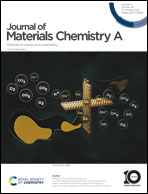Design of a potassiophilic 3D conductive scaffold potassium anode (3D-CTZ@K) with dendrite-free and high energy-power density in potassium metal batteries†
Abstract
Potassium (K) metal batteries are attracting considerable attention due to their low cost and high energy density. However, the practical application of K metal batteries is hampered by severe K dendrite growth and enormous volume variation during cycling on the K anode. Herein, a 3D-CTZ@K anode was fabricated by infusing molten K into a near-perfect scaffold (3D-CTZ), which was constructed by adsorbing K nucleation “seeds” (Ti3C2 MXene encapsulated ZnO nanoparticles, denoted as TZ hybrids) inside a 3D inter-connected porous carbon foam (3D-CF). Because of high potassiophilicity, large void space, extraordinary mechanical stability, and electron conductivity, the 3D-CTZ scaffold not only provides abundant K nucleation sites and rapid electron transfer paths but also physically confines the K deposition, suppressing volume variation during K plating/stripping processes. Consequently, 3D-CTZ@K achieves a dendrite-free K behavior and alleviates volume variation, realizing extraordinary cycle stability and high rate capability. The 3D-CTZ@K//PB full battery also delivers excellent long-cycle stability with an enhanced capacity retention of 75.1% and an ultrahigh energy density of 352.5 W h kg−1 at a power density of 7548.2 W kg−1. Such a sustainable K anode design sheds light on the design of dendrite-free K metal batteries and also other alkali metal batteries.



 Please wait while we load your content...
Please wait while we load your content...